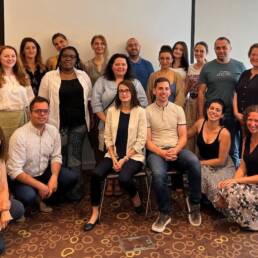Download the full report
In Caritas we see on a daily basis how people suffer due to poverty, inequality, unjust treatment, discrimination, violence and exclusion. Caritas helps the people in need, often through innovative projects and services, demonstrating that a better world is possible.
We also analyse the dimension and the structural causes of these situations of need, poverty and exclusion in order to ensure that the centrality of the person is applied in policies and societal behaviours. We want to influence the structural aspects and related causes in order to achieve positive outcomes for those affected. This is advocacy.
Advocacy, the claim for justice for the poor and excluded, is the natural consequence and an intrinsic dimension of Caritas action, which is based on the two pillars of the Christian virtues of charity and justice. During the past 15 years, the European Caritas organisations have coordinated advocacy efforts towards the national governments and the European institutions, particularly on such issues as poverty, social exclusion, inequality, migration and asylum, development, the right to food, and humanitarian principles. These efforts have resulted in important achievements.
It is time to share these achievements, to acknowledge in a simple way what we understand under advocacy, how we implement it. For this reason we present this handbook: it is an invitation to continue discussing and improving our efforts to “lend our voice to the causes of the poor”.1
The main objective of this handbook is to provide an introduction to Caritas organisations as to why “Caritas Europa aims to improve the quality of life of people experiencing poverty or in situation(s) of vulnerability by advocating for integral human development and social justice” (Caritas Europa’s Strategic Framework 2020).
Before being able to clarify the reasons Caritas organisations should do advocacy, however, it is necessary to first describe what is meant by advocacy and how advocacy is put into practice. The most tangible way to do this is to present a few advocacy successes that Caritas Europa has achieved in the recent past. The authoritative basis of Caritas’ advocacy is its daily and direct closeness and work with people who suffer from poverty, but also its constructive approach “to bring hope also to those men and women responsible to change the unjust structures”.2 This handbook will also provide some insight into the utilisation of advocacy tools and techniques.
Caritas Europa, i.e. the network of the European Caritas organisations, as part of the global Caritas Internationalis confederation, ensures the qualitative strengthening of the network by facilitating the exchange of knowledge, experience and expertise. The expected results from this combination are that Caritas Europa achieves strong advocacy outcomes across Europe, thereby bringing about necessary structural changes towards improving the living situation of people and communities experiencing poverty.
My most heartfelt gratitude goes to the people who raise their voice with and for the poor, to all the Caritas advocates and to the politicians and stakeholders with the political will to serve those most in need.
The authorship of this handbook is broad. It brings together the collective intelligence of many people in Caritas at grassroots, national, European and global levels. A big thank you is due to the Caritas advocates who contributed to this publication.
More information
Maria Nyman
Secretary General
Stand in Policy and Advocacy Director
Tel: +32 (0)2 235 03 92
Mob: +32 (0)495 17 47 48
mnyman@caritas.eu




